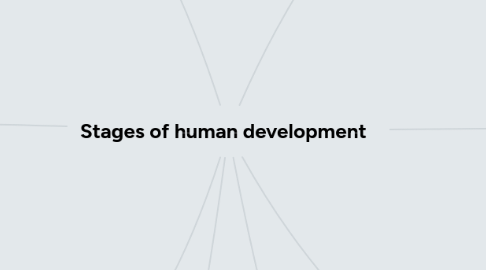
1. Adolescence
1.1. It's the stage between eleven and twenty years of age.
1.1.1. physical development
1.1.1.1. Physical growth and other changes are rapid and profound. production maturity is presented and the main health risks are due to behavioral problems, such as eating disorders or drug addiction.
1.1.2. cognitive aspect
1.1.2.1. The capacity of the astracto thought and the scientific reasoning is developed. You perceived the immaturity of thought in some attitudes and co-behaviors. Education focuses on preparation for college or work
2. Early adulthood
2.1. It is the scenario between twenty and forty years of age.
2.1.1. physical development
2.1.1.1. The physical condition reaches its maximum level and then decreases slightly, lifestyle choices influence health
2.1.2. cognitive aspect
2.1.2.1. The thought and the moral judgments acquire greater complexity. Educational and labor elections are held sometimes after a stage of exploration
3. Average adulthood
3.1. It is the stage between forty and sixty-five years of age.
3.1.1. physical development
3.1.1.1. A slow deterioration of the sensory capacities can begin, as well as of the health, the vigor and the resistance but the difference between the individuals are wide, the women suffer the menopause and the andropause men
3.1.2. cognitive aspect
3.1.2.1. Mental skills reach their maximum as competition and practical ability to solve problems rises. Some achieve professional success and others experience exhaustion and change of profession
4. Late adulthood
4.1. It is the stage between the sixty-five years of age and above
4.1.1. physical development
4.1.1.1. Most people are healthy and active, although in general their health and physical abilities decrease. the decrease in reaction times affects some aspects of the operation
4.1.2. cognitive aspect
4.1.2.1. Almost all people are mentally alert although some areas of intelligence and memory deteriorate, most people try to compensate
5. Prenatal
5.1. It develops in the mother's womb (pregnancy). It passes from the conception or fertilization of the new being (union of the female and male sexual cells, the ovum and the sperm) until its birth in childbirth.
5.1.1. It has three periods:
5.1.1.1. 1. ZIGOTIC GERMINAL PERIOD: when the sperm fertilizes the egg and the egg or zygote (or zygote) is formed. This initial cell begins to be subdivided into other cells and increases in size to form the embryo, which at the end of the second week takes root in the uterus.
5.1.1.2. 2. EMBRYONARY PERIOD Period of pregnancy that goes from the end of the second week after conception until the end of the third month (first 12 weeks). The embryo is in development and this is the period in which it is most sensitive to possible damage by various factors
5.1.1.3. 3. FETAL PERIOD It is the period in which the embryo reaches its culmination, the fetus has already defined the form of a human being and will continue to develop 7 months more until leaving the womb or maternal womb through birth or delivery. The birth or birth marks the end of this stage of human development and gives rise to the stage of childhood.
6. Childhood
6.1. It is the stage between birth and three years of age.
6.1.1. It has two periods:
6.1.1.1. 1. NEONATAL PERIOD: This newborn lives during the first month after birth the Neonatal Period, weighs about 3 kilos and has a disproportionate head in relation to his body. The newborn sleeps most of the time. During the Neonatal Period manifests the following changes or progress: 1. The first reflex acts appear like suction of the maternal breast and reaction of strong sounds. 2. He also makes spontaneous and undifferentiated movements: he shakes and twists his body, moves his arms and legs, pedals, etc. 3. It also presents indiscriminate emotional reactions of agitation and excitement due to a loss of balance of the organism and pleasant and unpleasant stimuli.
6.1.1.2. 2. CHILD DEVELOPMENT PERIOD: In the first years of the childhood stage after the neonatal period, the human being is interested in exercising their sensory organs, movements and language, and repeatedly manipulates the objects within their reach. Through this learning in the first three years the human being acquires basic skills such as handling their hands, standing up, walking, talking, even moving through their own environment
7. Early childhood
7.1. It is the stage between three and six years of age.
7.1.1. physical development
7.1.1.1. The growth is constant, the appearance is more esvelto and they are more similar to that of an adult, the appetite is reduced and sleep problems are common and motor coordination improves
7.1.2. cognitive aspect
7.1.2.1. The thought is egocentric but increases the understanding of the point of view of others. Memory and language are consolidated.
8. Average childhood
8.1. It is the stage between six and eleven years of age.
8.1.1. physical development
8.1.1.1. Growth slows down and sports strength and capabilities increase. Respiratory diseases are common but health in general is better than at any other time in the life cycle.
8.1.2. cognitive aspect
8.1.2.1. It reduces the egocentrism, the children begin to think logically and concretely, the memory and language skills are increased. Cognitive advances allow children to veneficiarce at school. Some children reveal special needs and gifts.

